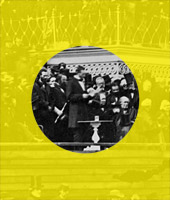Words of Healing for a Divided Nation: Yesterday and Today
Excerpts Ronald White's SPU Address

Abraham Lincoln delivered his Second Inaugural Address from the East Portico of the Capitol Building on March 4, 1865.
Photo by Alexander Gardner/Courtesy of Library of Congress. |
In his keynote speech at SPU’s 2009–10 Day of Common Learning, biographer Ronald C. White Jr. described how President Abraham Lincoln’s Second Inaugural Address transformed its listeners –– and a nation. Lincoln’s words, said White, reveal the keys to his understanding of leadership.
The day of Lincoln’s second inauguration was a terrible windy, rainy, cloudy day. People came — 25,000 to 35,000 of them.
A reporter for the Times of London noticed that there was a group of people there who had probably never been to an inauguration before. They were African-Americans, dressed in red and green and blue –– bright colors.
The crowd was also noticeable because of all the soldiers present. It was a shocking sight. Civil War surgery was marked by amputation. Three-quarters of the surgeries were amputations. And the soldiers there were missing legs and arms; 620,000 dead would be the casualties of the Civil War.
I read the letters and the diaries of those who were present at Lincoln’s second inauguration, and I expected that they would be excited. But the dominant motif of those letters was anger. Deep anger. Every person there had probably lost a father, husband, son, or brother, and they were deeply angry at the South, and they wanted Lincoln to do what we usually do in times of war — to demonize the enemy. That’s what they expected. They would cheer mightily when he would demonize the South.
But instead, Lincoln offered a completely different address from what anyone expected that day.
Here are some of the words that took the audience by surprise: “Both read the same Bible, and pray to the same God.”
Lincoln is signaling to his audience that he intends to think with them theologically as well as politically about the meaning of the Civil War. But notice that the transformational leader begins inclusively: “Both read the same Bible.” The Confederates, he’s saying to his audience, though they may not want to hear it, are reading the Bible every bit as much as the Union soldiers. The people of the South read the Bible every bit as much as the people of the North.
One of the surprising aspects of my research for my first Lincoln book was to travel to the American Bible Society in New York City. It’s the only 19th-century evangelical voluntary society that still exists in the 21st century. In their archives are all these Civil War Bibles, often with blood on them, often with a life verse that a soldier had written on the first page.
“Both read the same Bible, and pray to the same God,” says Lincoln, “and each invokes his aid against the other.” But, he continues, “The prayers of both could not be answered. That of neither has been answered fully.” He wants us to know, “The Almighty has His own purposes.”
The reporter for the Times of London began to hear something coming from way back in the audience.
He strained to hear what it was. Finally he picked it up.
It started at the back and began to roll forward: “Bless the Lord. Bless the Lord. Bless the Lord.” The African-Americans in the crowd picked up the chant. They understood what Lincoln was saying. “Bless the Lord. Bless the Lord.”
Frederick Douglass, the greatest African-American of the 19th century, wrote in his journal that evening: “This was not a state paper. This was a sermon.”
In a nation so bitterly divided, Lincoln suggests to us that we ought to move forward from this moment in forgiveness and reconciliation — “with malice toward none, with charity for all.” Is that really possible? As you and I listen to the talk around us with people shouting at each other on television, demeaning each other; as we are called to be transformational leaders in our time, is it possible to move beyond that? To speak out of the center of faith? To speak words of healing? To speak words of reconciliation?
I think that as a transformational leader, Lincoln can give us the gift of inclusivity. He can teach us what it means to be humble. He can help us understand how, starting from a biblical foundation, we can move out from there with an internal moral compass that is not always attuned to what other people say we should do, but is attuned to what we believe we ought to be doing.
View White's full Day of Common Learning address at iTunesU.
Return to top
Back to Features Home
|